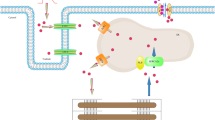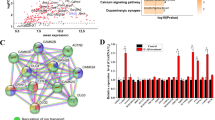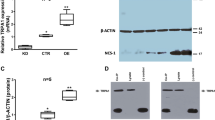Abstract
Voltage-gated type 7 K+ (KV7 or KCNQ) channels regulate the contractility of various smooth muscles. With this study, we aimed to assess the role of KV7 channels in the regulation of human detrusor contractility, as well as the gene and protein expression of KV7 channels in this tissue. For these purposes, the isolated organ technique, RT-qPCR, and Western blot were used, respectively. XE-991, a selective KV7 channel blocker, concentration-dependently contracted the human detrusor; mean EC50 and Emax of XE-991-induced concentration-response curve were 14.1 μM and 28.8 % of the maximal bethanechol-induced contraction, respectively. Flupirtine and retigabine, selective KV7.2–7.5 channel activators, induced concentration-dependent relaxations of bethanechol-precontracted strips, with maximal relaxations of 51.6 and 51.8 % of the precontraction, respectively. XE-991 blocked the relaxations induced by flupirtine and retigabine. All five KCNQ genes were found to be expressed in the detrusor with KCNQ4 being the most expressed among them. Different bands, having sizes similar to some of reported KV7.1, 7.4, and 7.5 channel subunit isoforms, were detected in the detrusor by Western blot with the KV7.4 band being the most intense among them. In conclusion, KV7 channels contribute to set the basal tone of the human detrusor. In addition, KV7 channel activators significantly relax the detrusor. The KV7.4 channels are probably the most important KV7 channels expressed in the human detrusor. These data suggest that selective KV7.4 channel activators might represent new pharmacological tools for inducing therapeutic relaxation of the detrusor.





Similar content being viewed by others
References
Adduci A, Martire M, Taglialatela M et al (2013) Expression and motor functional roles of voltage-dependent type 7 K+ channels in the human taenia coli. Eur J Pharmacol 721:12–20. doi:10.1016/j.ejphar.2013.09.061
Afeli SAY, Malysz J, Petkov GV (2013) Molecular expression and pharmacological evidence for a functional role of KV7 channel subtypes in guinea pig urinary bladder smooth muscle. PLoS One 8(9):e75875. doi:10.1371/journal.pone.0075875
Anderson UA, Carson C, Johnston L et al (2013) Functional expression of KCNQ (KV7) channels in Guinea pig bladder smooth muscle and their contribution to spontaneous activity. Br J Pharmacol 169:1290–1304. doi:10.1111/bph.12210
Brading AF (2006) Spontaneous activity of lower urinary tract smooth muscles: correlation between ion channels and tissue function. J Physiol 570(1):13–22
Brown DA, Passmore GM (2009) Neural KCNQ (KV7) channels. Br J Pharmacol 156:1185–1195. doi:10.1111/j.1476-5381.2009.00111.x
Currò D (2014) K+ channels as potential targets for the treatment of gastrointestinal motor disorders. Eur J Pharmacol 733:97–101. doi:10.1016/j.ejphar.2014.03.049
Currò D (2016) The modulation of potassium channels in the smooth muscle as a therapeutic strategy for disorders of the gastrointestinal tract. Adv Protein Chem Struct Biol 104:263–305. doi:10.1016/bs.apcsb.2015.12.002
Currò D, De Marco T, Preziosi P (2004) Evidence for an apamin-sensitive, but not purinergic, component in the nonadrenergic noncholinergic relaxation of the rat gastric fundus. Br J Pharmacol 143:785–793
Currò D, Bientinesi R, Sacco E, Bassi PF (2014) Motor effects of KV7 channel modulators n the human detrusor. From the Pharmacology 2014 Meeting: Proceedings of the British Pharmacological Society at http://www.pA2online.org/abstracts/vol12Issue3abst070P.pdf
Greenwood IA, Ohya S (2009) New tricks for old dogs: KCNQ expression and role in smooth muscle. Br J Pharmacol 156:1196–1203. doi:10.1111/j.1476-5381.2009.00131.x
Gutman GA, Chandy KG, Grissmer S et al (2005) International Union of Pharmacology. LIII. Nomenclature and molecular relationships of voltage-gated potassium channels. Pharmacol Rev 57:473–508
Hashim H, Abrams P (2006) Is the bladder a reliable witness for predicting detrusor overactivity? J Urol 175:191–194
Hashitani H, Brading AF (2003) Electrical properties of detrusor smooth muscles from the pig and human urinary bladder. Br J Pharmacol 140:146–158
Hayase M, Hashitani H, Kohri K et al (2009) Role of K+ channels in regulating spontaneous activity in detrusor smooth muscle in situ in the mouse bladder. J Urol 181:2355–2365
Ipavec V, Martire M, Barrese V, Taglialatela M, Currò D (2011) KV7 channels regulate muscle tone and nonadrenergic noncholinergic relaxation of the rat gastric fundus. Pharmacol Res 64:397–409. doi:10.1016/j.phrs.2011.06.016
Jepps TA, Olesen SP, Greenwood IA (2013) One man’s side effect is another man’s therapeutic opportunity: targeting KV7 channels in smooth muscle disorders. Br J Pharmacol 168:19–27. doi:10.1111/j.1476-5381.2012.02133.x
Miceli F, Soldovieri MV, Martire M et al (2008) Molecular pharmacology and therapeutic potential of neuronal KV7-modulating drugs. Curr Opin Pharmacol 8:65–74
Michel MC, Radziszeswski P, Falconer C et al (2008) The centrally acting ion channel modulator flupirtine improves bladder function in animal models and patients with overactive bladder syndrome. Available at http://www.ics.org/Abstracts/Publish/46/000406.pdf
Michel MC, Radziszewski P, Falconer C et al (2012) Unexpected frequent hepatotoxicity of a prescription drug, flupirtine, marketed for about 30 years. Br J Clin Pharmacol 73:821–825. doi:10.1111/j.1365-2125.2011.04138.x
Motulsky HJ (2014) Common misconceptions about data analysis and statistics. Naunyn Schmiedeberg’s Arch Pharmacol 387:1017–1023. doi:10.1002/prp2.93
Peroz D, Rodriguez N, Choveau F et al (2008) KV7.1 (KCNQ1) properties and channelopathies. J Physiol 586:1785–1789. doi:10.1113/jphysiol.2007.148254
Petkov GV (2012) Role of potassium ion channels in detrusor smooth muscle function and dysfunction. Nat Rev Urol 9:30–40. doi:10.1038/nrurol.2011.194
Rode F, Svalø J, Sheykhzade M et al (2010) Functional effects of the KCNQ modulators retigabine and XE991 in the rat urinary bladder. Eur J Pharmacol 638:121–127. doi:10.1016/j.ejphar.2010.03.050
Rothberg BS (2012) The BK channel: a vital link between cellular calcium and electrical signaling. Protein Cell 3:883–892. doi:10.1007/s13238-012-2076-8
Rundfeldt C, Netzer R (2000) Investigations into the mechanism of action of the new anticonvulsant retigabine. Interaction with GABAergic and glutamatergic neurotransmission and with voltage gated ion channels. Arzneimittelforschung 50:1063–1070
Sacco E, Pinto F, Bassi PF (2008) Emerging pharmacological targets in overactive bladder therapy: experimental and clinical evidences. Int Urogynecol J Pelvic Floor Dysfunct 19:583–598. doi:10.1007/s00192-007-0529-z
Sibley GN (1984) A comparison of spontaneous and nerve-mediated activity in bladder muscle from man, pig and rabbit. J Physiol 354:431–443
Soldovieri MV, Miceli F, Taglialatela M (2011) Driving with no brakes: molecular pathophysiology of Kv7 potassium channels. Physiology (Bethesda) 26:365–376. doi:10.1152/physiol.00009.2011
Stott JB, Jepps TA, Greenwood IA (2014) KV7 potassium channels: a new therapeutic target in smooth muscle disorders. Drug Discov Today 19:413–424. doi:10.1016/j.drudis.2013.12.003
Streng T, Christoph T, Andersson K-E (2004) Urodynamic effects of the K+ channel (KCNQ) opener retigabine in freely moving, conscious rats. J Urol 172:2054–2058
Svalø J, Hansen HH, Rønn LC et al (2011) KV7 positive modulators reduce detrusor overactivity and increase bladder capacity in rats. Basic Clin Pharmacol Toxicol 110:145–153. doi:10.1111/j.1742-7843.2011.00765.x
Svalø J, Bille M, Parameswaran Theepakaran N et al (2013) Bladder contractility is modulated by KV7 channels in pig detrusor. Eur J Pharmacol 715:312–320. doi:10.1016/j.ejphar.2013.05.005
Svalø J, Sheykhzade M, Nordling J et al (2015) Functional and molecular evidence for KV7 channel subtypes in human detrusor from patients with and without bladder outflow obstruction. PLoS One 10(2):e0117350. doi:10.1371/journal.pone.0117350
Wang H-S, Pan Z, Shi W et al (1998) KCNQ2 and KCNQ3 potassium channel subunits: molecular correlates of the M-channel. Science 282:1890–1893
Wladyka CL, Kunze DL (2006) KCNQ/M-currents contribute to the resting membrane potential in rat visceral sensory neurons. J Physiol 575:175–189
Yeung SY, Greenwood IA (2005) Electrophysiological and functional effects of the KCNQ channel blocker XE991 on murine portal vein smooth muscle cells. Br J Pharmacol 146:585–595
Acknowledgments
This study was supported by “Fondi di Ateneo” of the Catholic University of the Sacred Heart, Rome. The technical help of Ms. S. Catino (Institute of Pharmacology, Catholic University of the Sacred Heart, Rome, Italy) with the Western blot experiments is deeply acknowledged. The authors are indebted to Prof. M. Taglialatela (Department of Health Sciences, University of Molise, Campobasso, Italy), for the generous gift of retigabine and the antibody anti-KV7.5 channels, and to Mr. R. Donato for revision of English.
Author information
Authors and Affiliations
Corresponding author
Ethics declarations
Conflict of interest
The authors declare that they have no conflict of interest.
Ethical approval
All procedures performed in studies involving human participants were in accordance with the ethical standards of the institutional and/or national research committee and with the 1964 Helsinki Declaration and its later amendments or comparable ethical standards.
Informed consent
Informed consent was obtained from all individual participants included in the study.
Rights and permissions
About this article
Cite this article
Bientinesi, R., Mancuso, C., Martire, M. et al. KV7 channels in the human detrusor: channel modulator effects and gene and protein expression. Naunyn-Schmiedeberg's Arch Pharmacol 390, 127–137 (2017). https://doi.org/10.1007/s00210-016-1312-9
Received:
Accepted:
Published:
Issue Date:
DOI: https://doi.org/10.1007/s00210-016-1312-9




